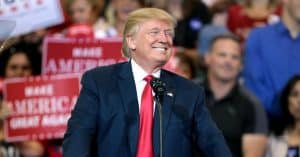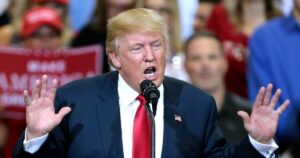Trump Challenges Biden's Telework Policy; Union Prepared To Respond
President-elect Donald Trump announced plans to challenge a telework policy implemented during President Joe Biden's administration, promising legal steps to reverse it. The policy allows tens of thousands of federal employees to work remotely until 2029.
Trump, alongside the newly appointed leaders of the Department of Government Efficiency, argues that the policy diminishes government productivity and increases spending.
During a press conference on Monday, Trump criticized the telework agreement as overly generous to unions and detrimental to governmental efficiency. This agreement, recently ratified between the American Federation of Government Employees (AFGE) and the Social Security Administration (SSA), enables 42,000 SSA workers to telework through October 25, 2029.
New Leadership at the Department of Government Efficiency
Trump appointed tech moguls Elon Musk and Vivek Ramaswamy to spearhead the Department of Government Efficiency. Both appointees are known for their critical views on remote work and have proposed it as a measure to induce voluntary layoffs, thereby streamlining federal operations.
The duo argues that a return to office work will not only cut costs but also boost efficiency across federal departments. Their stance is clear: if employees resist returning to the office, then they should not remain on the federal payroll.
Union Defends Telework Benefits
Contrary to the administration's viewpoint, AFGE National President Everett Kelley defended the telework policy. Kelley highlighted its advantages, such as enhanced productivity, improved disaster preparedness, and maintained continuity of operations during crises.
Kelley also pointed out that the rumors about widespread federal telework are exaggerated. He noted that most federal employees cannot telework due to the nature of their jobs, and those who do still spend a significant portion of their time in the office.
Further defending the agreement, Kelley emphasized the legal binding of collective bargaining agreements, expressing confidence that the incoming administration would respect these lawful contracts. He firmly stated the union's readiness to enforce their rights if necessary.
Political Support for Reversing Telework Policy
Support for Trump's position is echoed by Senator Joni Ernst, who criticized the telework policy for being too lenient. Ernst expressed her commitment to collaborate with Musk, Ramaswamy, and the Department of Government Efficiency to promptly address the issue and increase in-office presence among federal workers.
Ernst's support underscores a broader critique within some political circles that the policy could diminish the effectiveness and accountability of government operations.
In conclusion, Trump's move to overturn the telework policy sets the stage for a significant standoff between the incoming administration and federal unions. With legal challenges looming and both sides standing firm, the outcome of this dispute will likely have far-reaching implications for federal workforce management and government efficiency initiatives.




